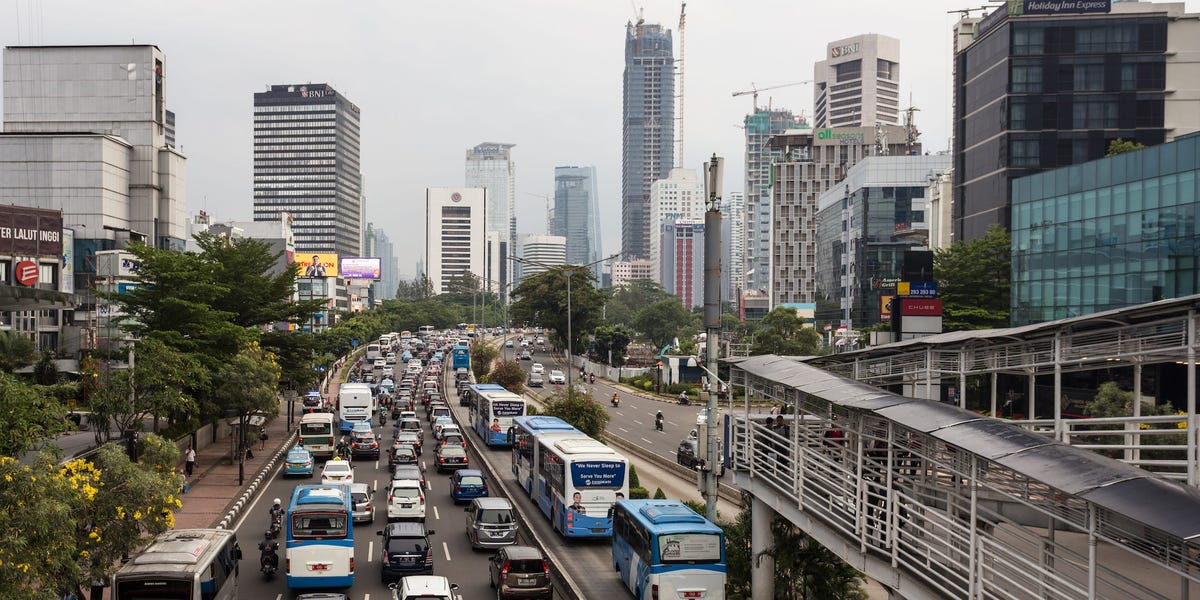- The Indonesian economy has been riding a strong wave in recent years, with record growth in 2022.
- However, Russia’s invasion of Ukraine, which has dented economies around the world, is contributing to growth slowing down in Indonesia.
- The food sector has been strongly affected by the war in Ukraine, which has disrupted wheat and fertilizer imports into Indonesia.
After recording economic growth of 5.3% in 2022, the strongest for almost a decade, Indonesia is now braced for growth to slow down intensified by Russia’s invasion of Ukraine. With weakening commodity and energy prices denting export earnings, Indonesia is contending with economic headwinds as fears of a global recession mount.
A few months ago, things didn’t look so bad. Although Indonesian consumers faced higher prices for some commodities, initially the country — the largest economy in Southeast Asia — saw its currency grow stronger as the conflict led to rising prices for global commodities. That rally, which lifted Indonesia’s receipts from exports of iron, steel, coal, and palm oil, proved short-lived. It was overtaken by a damaging combination of weakening global demand, higher interest rates, and inflation. In January, Indonesia’s Coordinating Minister for Economic Affairs Airlangga Hartarto said exports would grow by 12.8% this year, less than half the rate of 29.8% growth Hartarto cited for 2022 — albeit the 2022 rate may have included a post-pandemic bounce.
A concerning sign of things to come appeared in December, when palm oil exports slowed. The Organisation for Economic Cooperation and Development warned recently that the main downside risks for Indonesia included “persistent tensions on energy, fertilizer and food markets.”
The energy and food sectors have been the worst-hit by the war, pushing inflation higher
“The worst-hit sectors are energy — coal and crude oil — and also commodities, especially corn and wheat imports, which are now much more expensive,” said Adriana Elisabeth, senior political analyst at the Center for Political Studies, Indonesian Institute of Sciences. “Consumption of wheat is relatively high, which poses real challenges for the country’s food resilience.”
Although, by comparison with many countries, inflation of around 5.5% is relatively low, it still represents a seven-year high for Indonesia. That figure is double that of projected rates of inflation for neighboring Malaysia and Thailand this year. In January, the country’s central bank, Bank Indonesia, lifted its key interest rates by 25 basis points to 5.75%, the sixth consecutive increase. In August they were just 3.5%.
The Indonesian government has worked hard to protect Indonesian consumers from price increases, but the government has had to raise subsidized fuel prices by 30% to protect the state budget.
Ordinary Indonesians report fast-rising prices of staples such as noodles, flour, cooking oil, pepper, eggs, chili, and tea. Street prices have exceeded the official rate of inflation, with noodle kiosks hiking their prices by more than 10%, and the price of packs of instant noodles rising by as much as 20% in recent months. And while the UN’s Food and Agricultural Organization believes Indonesia’s food security levels to be stable, the country has been affected by the disruption of wheat production stemming from Russia’s invasion of Ukraine, as both Russia and Ukraine are among the world’s largest wheat producers.
“Indonesians’ primary staple food is rice, but Indonesia also imports huge amounts of wheat from Ukraine for noodles, which Indonesians consume in large quantities,” said Dewi Fortuna Anwar, professor at the Research Center for Politics in the National Research and Innovation Agency, an Indonesian government agency. “Indonesia also imports fertilizer from Russia. The food sector is therefore the most affected by Russia’s invasion of Ukraine, affecting both agricultural producers and consumers with high prices and contributing to higher inflation.”
So far, Indonesia’s moves to mitigate the deteriorating economic situation have not been met by an effective Russian response. Last summer, in an effort to obtain “security guarantees for food and fertilizer supplies from both Ukraine and Russia,” President Joko Widodo traveled to Moscow to meet Russian President Vladimir Putin. Hopes that Widodo would be able to secure such guarantees from Moscow, along with a restored energy supply chain, went unfulfilled. Putin has obstructed inspections that are part of the Black Sea Grain Initiative, blocking food from reaching those who need it — adding to the tightening financial squeeze on Indonesian families.
Elisabeth said Indonesians are paying a price for the Ukraine war in terms of “lower purchasing power and a fiscal crisis as taxation shifts from producers to consumers, while at the same time investors are tending to move away from Indonesia.”
Indonesia, one of Asia’s success stories of recent years, has been less hard-hit than many emerging economies by the war in Ukraine. Yet storm clouds persist and the severe slowdown being experienced by advanced economies is set to cause more turbulence for Indonesia.
Only one path to peace meets with international approval, and that is the path supported by Indonesia. On February 24, 2023, one year after the full-scale invasion of Ukraine by Russia, Indonesia voted with 140 other nations at the UN General Assembly in favor of Russia’s immediate, complete, and unconditional withdrawal from Ukraine. For Ukraine, that is the only possible end to the war, and the only way to secure a comprehensive, just, and lasting peace.
This article was created by Insider Studios with the Foreign, Commonwealth & Development Office.
